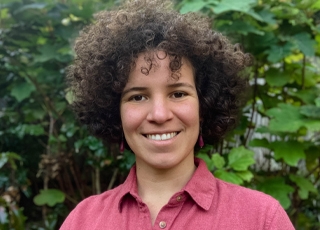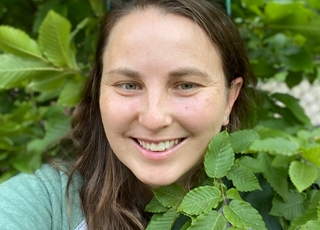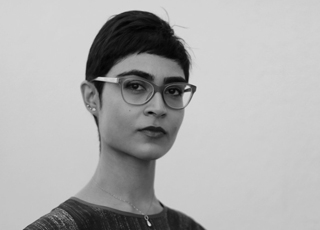New Courses for the Fall of 2023
Bennington College faculty are encouraged to follow their own interests and the interests of their students as they propose their classes. As a result, classes, as many as half of which are new each term, feature topics that are always reflecting new lines of inquiry.
Rather than a standard English 101, students choose from courses like, “Chosen Family Style: Queer Asian Pacific American Literature” with Franny Choi or “Ecopoetics: Earth, Air, Water, and Fire” with Sandra Simonds. Here’s a small sample of the new courses on offer in the Fall of 2023.
Photography and Migration

Visual anthropologist and artist Luiza Folegatti is offering Photography and Migration, which will introduce students to the components of storytelling in photographic series, examine migration as a theme, consider the use of photography as a research tool, and build an understanding of an ethically informed artmaking process that can be used across media.
“This class is a little mix: it's photography with social sciences and community work. It brings those different topics together,” said Folegatti, who has worked with migrants and has researched migration through photography over the past few years.
Folegatti appreciates the multidisciplinary nature of the class, which allows for an examination of image making as a process. Students will have an opportunity to study representations of migration in diasporic communities, engage methods for creating visual narratives, and develop a robust sense of artistic ethics.
“In my work, I would often hear from migrants that they feel like they're disappearing or like they have to reinvent themselves,” said Folegatti. “I want students to be aware of the power dynamics that exist in image making, especially when working with people whose experiences differ from their own.
She continued, “I believe that when we put these different areas of study together, we allow this space for co-creating a narrative with the participant of our story.”
In addition to studying aspects of visual storytelling, like color, composition, and sequencing images, students will also engage with advocates at the Berkshire Immigrant Center in Pittsfield, Massachusetts. By working directly with those serving immigrants in a grassroots capacity, she hopes that students will learn how migrants come to understand their rights and get the information they need to make decisions for themselves and their families.
Students will also engage with Usdan Gallery, which will exhibit artists from Central America this fall.
“It is really good that this exhibit is happening at the same time as my course, because it allows us to examine how to put together a platform for artists to show their works and what it means to create an exhibition about diasporic artists and how the audience relates to it.”
How to Build a Forest

New to the Bennington College faculty, plant ecologist and conservationist Caitlin McDonough MacKenzie is offering a 2000-level, four-credit course called How to Build a Forest, which will examine forest ecology, land use change, and forest succession using the campus’s woodlands.
“This is such an amazing place to spend time outdoors,” said MacKenzie. “When I got the job, one of the very first things I was thinking about was, ‘I need to have a class where we just get to spend time outside here on campus, because this is such a special, beautiful place.’”
Students will explore the composition, structure, and function of local forests over the last 15,000 years and discuss the environmental conditions, disturbance dynamics, and biotic interactions responsible for the forest we have today.
“I genuinely love forest ecology as a field,” said MacKenzie. “I think it's really interesting to consider what happens in a forest and how forests function. And it's really important right now to think about the future of our forests.” She notes climate change’s influence on how ecosystems function and the impact of development.
Each week, students will bring a different set of field methods to the forest landscape. Students will learn tree identification, to measure trees in several ways, to spot glacial activity, and to determine soil pH. MacKenzie will break the class into smaller groups and assign subplots, so each student gets plenty of practice and can see how the area they are studying is similar or dissimilar from areas that are close by. The last few weeks of class will be about communicating what they have learned.
“That's kind of the fun, seeing what everyone brings to it and how they approach it. I'm excited to see what students want to do with this information and how they share it with the rest of the college community.”
Ethical Translation: Eye on Race, Gender, and Queerness

When visiting faculty member Mariam Rahmani was translating the prize-winning Iranian novel In Case of Emergency from Farsi into English, there were some questions about how race and gender should be portrayed in the translated work. A new course, Ethical Translation: Eye on Race, Gender, and Queerness, a version of which was first taught at University of California, Los Angeles, sprang from her experiences and a need to provide tools that will help translators counter the field’s colonialist and imperialist heritage.
“It is my belief that every translation is political,” Rahmani said. “We can use translation as a kind of resistance against various forms of power. I am trying to contribute myself to that practice, and to grow in that practice, then extend that conversation to students.”
The course blends both seminar and workshop experiences. By reading both translated works and about translation, while also translating themselves, Rahmani hopes that students learn both the theoretical and the practical.
Students will read essays, interviews with translators, and translators’ notes. They will talk about translators’ ability to amplify marginalized voices and what politically motivated mistranslations have meant for generations of readers.
The students will also put their knowledge to work translating work. As the course description says, “anyone who likes to read and has some second-language skills, can—and should—translate!”
“Yes, it is a call to action. As writers, we really think about our own voices, but we also need to think about the diversity of voices. It's basically just a project of not accepting the current limitations and of expanding our literary universe. Nobody is going to do it for us. It’s a grassroots effort.”
Rahmani stresses, though, that however great the responsibility, translation is also really fun. She revels in the challenges and opportunities that translation allows a writer to focus on every word and understand the mechanics of a piece.
“I think most writers, if they gave it a chance, would find it enjoyable, because they are in the business of thinking about words and how language works.”
And, she promises, translation holds great potential for writers hoping to improve their own original writing.
“It's such a good way, actually probably the best way, of teaching craft, because it forces you to think very carefully about every single element on the page.”
More Courses
These are just three of several new classes being taught in the Fall of 2023. A few others include a course in Politics called “The Animal That Therefore I Am” from John Hultgren, a course about "Gender and Sexuality in Chinese Culture” from Ginger Lin, and a Drama class from Sherry Kramer called "There Is Always a Clock."